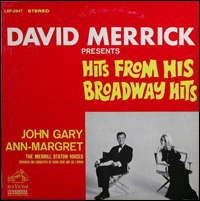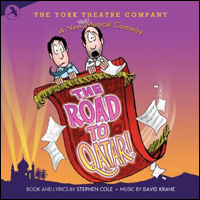
*
A Thurber Carnival [Masterworks Broadway 88691 91138]
The winter of 1960 was brightened, in the environs of Broadway at least, by the arrival of A Thurber Carnival. This was what might be considered a jukebox musical revue, except the jukebox selections were prose rather than song. The unique American humorist James Thurber (1894-1961) had since 1927 been writing stories, articles, and even one hit Broadway comedy, The Male Animal; he had also made a name for himself as one of the unlikeliest cartoonists of his time.
"A Thurber Carnival" was a best-selling anthology first published in 1945, containing much of the best of Thurber to that point. As the '50s came to an end, director Burgess Meredith — with Thurber's active participation — assembled a stage version of the anthology. Meredith is best remembered as a star of stage (Winterset), screen (as the trainer in the "Rocky" films) and the small screen (as Batman's recurring nemesis, the Penguin); his career in 1960 was in limbo, courtesy of Joe McCarthy's blacklist.
A Thurber Carnival met with considerable success, artistically at least. The show was widely hailed. "Both the freshest and funniest show on Broadway," said Brooks Atkinson in the Times. "Sheer delight," said Walter Kerr in the Trib. "A joyous, magnificently lunatic festival," said John Chapman in the News. Even Kenneth Tynan in The New Yorker agreed, calling it "easily the funniest show on Broadway." The Messrs. Thurber and Meredith were awarded a special Tony Award for their efforts.
Meredith assembled a group of strong comic actors. Heading the cast was Tom Ewell, who had achieved widespread fame and a Best Actor Tony in the 1952 comedy The Seven Year Itch; he repeated his role in the motion picture version, where he was somewhat overshadowed by his iconic costar. (That's the film in which Marilyn stands over the subway grates, dress in mid-air.) Ewell had two co-stars in the Thurber revue: Peggy Cass, who already had a Tony Award and an Oscar nomination for her role of Agnes Gooch in "Auntie Mame"; and Paul Ford, who had starred in the Pulitzer-winner Teahouse of the August Moon (on stage and screen) and was well known as Colonel Hall to Phil Silvers' "Sergeant Bilko." The stars were supported by the likes of John McGiver and Alice Ghostley. All are present on the original cast recording of A Thurber Carnival, performing selected sketches from the show. These include the opening and closing numbers, discussed below, and a number of comedy skits. There are also two lengthy scenes topping ten minutes: "File and Forget," an extended sequence of letters between a fictional Thurber and his fictional publishers; and Ewell's solo reading of the short story classic, "The Night the Bed Fell."
I well remember enjoying this cast album when I was a lad; at least I think I remember finding it refreshingly bright. Listening to it now for the first time since Nixon was reelected, I can only wonder. Perhaps my appreciation for Thurber's brand of comedy has dimmed? I hope not. But I find little of this recording funny or even amusing; as much as I appreciate hearing these actors — all of whom clearly have a feel for the material — the whole thing falls flat for me.
What is especially good is the music by Don Elliott, performed by the Don Elliott Quartet. There is not all that much of it, but the jazzy intro gets the recording off to a swinging start. There are two additional musical pieces, "Word Dance" sequences that open and close the show. This is cocktail party music — a swinging 1960 cocktail party — interrupted by comic punchlines. (This idea seems to have been borrowed by the producers of the television series "Laugh-In," which began in 1968.)
Punchlines such as "How could I tell the man what happened, when I didn't know the French for 'I have flushed my passport?'" and "I never dreamed their union had been blessed with issue, 'til their little daughter stabbed the superintendent of schools." And that old favorite, "If I called the wrong number, why did you answer the phone?" Which is to say, captions from Thurber's New Yorker cartoons, without the cartoons. I feel certain that these seemed very funny back when I first heard them, and I still find the cartoons effective. Here and now, on the recording, most fall flat.
Which leaves A Thurber Carnival, now finally back in circulation, slightly less than effervescent.
Visit PlaybillStore.com to view theatre-related recordings for sale.
| |
 |
|
| Original cover art for "David Merrick Presents Hits from His Broadway Hits" |
Also rescued from oblivion — and I mean oblivion — is "David Merrick Presents Hits from His Broadway Hits." One of the strangest Broadway albums I've heard, all right. Imagine, a dozen songs not written by a particular songwriter, or introduced by a particular performer, but linked simply because the shows from which they hail happen to have been produced by the same person. Which means they are not in any way stylistically similar, other than be virtue of being written within an 11-year span. (As it happens, there is a Broadway revue en route which is compiled from unrelated songs from musicals produced by one of Merrick's main competitors.)
There was presumably a logical reason for this recording. My guess is that it was an overture to the blockbuster deal RCA made with Merrick following the opening of Hello, Dolly!, which RCA recorded (and which is the latest Merrick musical included on the album). RCA saw fit to give Merrick a cool $2 million to finance his next shows. What they got for their money, alas, was plenty of nothing. Breakfast at Tiffany's, anyone? Mata Hari? How Now, Dow Jones? And Broadway's first million-dollar loser, The Happy Time.
What makes this album so odd is not the song selection, it is the vocalists and the arrangements. The latter are very much of the recording studio — as opposed to the theatre — circa 1964. They take songs of different styles, written for shows set in different eras, and make them all sound the same. This is difficult enough, even before we get to the singers (who are billed in a size half that of Merrick): RCA recording artists John Gary and — get this — Ann-Margret.
That's right, Ann-Margret at 23, just after her breakthrough role in the film version of Bye Bye Birdie. If you ever wanted to hear A-M sing "Is It Really Me?" from 110 in the Shade, here's your chance. She also gives us "Love Makes the World Go Round" from Carnival! and "As Long As He Needs Me" from Oliver! Very dramatic. Gary does an adequate job on items such as "Small World" from Gypsy and "Anyone Would Love You" from Destry Rides Again. Four songs each, plus four from the Merrill Staton Voices, whoever they were. The album is arranged and conducted by Henri Rene and Joe Lipman.
The liner notes contain no less than five full-page, full-color studio shots of the performers. (Together in photos, but decidedly not singing with each other.) Each photo is very different, with Ms. Margret sporting diverse hair styles in diverse colors. There's one shot where she looks like Sally Bowles in Cabaret — this in 1964, before Cabaret was written — with a purple feather boa, sitting with Gary on a motorcycle. One has to wonder just which of Merrick's hit musicals this was meant to represent. One of the songs included is "Comes Once in a Lifetime," from that Broadway hit of Merrick's called Subways Are for Sleeping. This is the sort of CD which comes once in a lifetime, too.
| |
 |
|
| Cover art for The Road to Qatar |
David Krane and Stephen Cole's spoof musical The Road to Qatar! had some fans when it was produced by the York Theatre Company in February 2011. I, alas, was not among them. This was a comic-book rendition of the true adventure the Messrs. Krane and Cole had in 2005, when they were imported to Qatar to write an original musical. The Road to Qatar attempted to turn the thing into a pint-size, campy musical, but that sort of thing turns treacherous when you miss the boat. Or miss the camel, as it were.
Fortunately, though, there is an audience of listeners out there for almost every professionally-produced musical. Jay Records, an independent U.K. label, has demonstrated continued dedication to the field. (This seems to be their 50th recording of a York Theatre musical.) So while I do not personally find The Road to Qatar to my taste, I am glad to spread the word that it has been recorded and is now available.
Visit PlaybillStore.com to view theatre-related recordings for sale.
(Steven Suskin is author of the recently released updated and expanded Fourth Edition of "Show Tunes" as well as "The Sound of Broadway Music: A Book of Orchestrators and Orchestrations," "Second Act Trouble" and the "Opening Night on Broadway" books. He also pens Playbill.com's Book Shelf and DVD Shelf columns. He can be reached at [email protected].)










